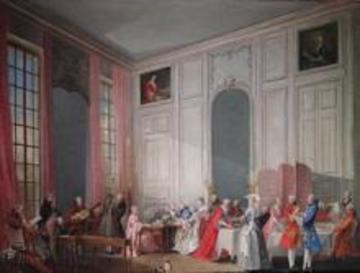Cross-European perspectives on the Enlightenment: Academic events at the Voltaire Foundation in early 2018
This piece is reblogged from the Voltaire Foundation. Please visit their blog for more information, upcoming posts and an archive of previous posts.
Catherine the Great, by Fyodor Rokotov, 1763.
The main aim of our academic programme in early 2018 is to develop comparative and original views on eighteenth-century European culture in a series of events. Enlightenment – in the singular or plural, preceded by a definite article or left indefinite – has long been treated as a largely Franco-British affair, extending from Newton and Locke to the French philosophes and their acolytes. The Enlightenment Workshop, Oxford’s interdisciplinary research seminar on eighteenth-century culture, seeks to challenge this view by examining Enlightenment phenomena all the way from St Petersburg to London via Austria, Prussia, and further afield in Europe. In 2018 the Workshop will take place at the Voltaire Foundation in both Hilary and Trinity Terms. Its speakers come from a variety of academic institutions: as well as showcasing eighteenth-century research conducted here at Oxford and elsewhere in the UK, we are delighted to host speakers from Hungary, Germany, California and the American East Coast.
Frederic II of Prussia, by Johann Georg Ziesenis, 1763.
While Paul Slack (Linacre College, Oxford) discusses the complex interrelations between seventeenth-century British ideas of socio-economic Improvement and an eighteenth-century Enlightenment, Shiru Lim (UCL) analyses the concept of philosophical kingship by juxtaposing the philosophes’ relationships with Catherine II of Russia and Frederick II of Prussia. Thematically and methodologically too, the Workshop aims to explore the Enlightenment from a variety of approaches. Elisabeth Décultot (Halle) asks whether we can still use the term ‘Enlightenment’ – and with which controversies and semantic fields we engage when we do so.[1] The theological implications of natural catastrophes, explored by László Kontler (Central European University, Budapest), are followed by a paper focusing on street-lighting in eighteenth-century Paris and its wider significance, to be presented by Darrin McMahon (Dartmouth College).
Moses Mendelssohn, after Anton Graff, 1771.
German Enlightenment controversies on art and religion are explored by Katherine Harloe (Reading) and Paul Kerry (Brigham Young University), whereas Caroline Warman (Jesus College, Oxford) turns her gaze to more radical thinkers in an overview of French materialism from Diderot to the Revolution. The famous Parisian salons of the Enlightenment are examined from a fresh perspective by Chloe Edmondson (Stanford University); such venues would not have been hospitable to the subject of Adam Sutcliffe’s (King’s College London) paper, Moses Mendelssohn, who is widely regarded as having launched the Jewish Enlightenment (Haskalah).
The Enlightenment Workshop concludes on 17 May 2018 with an interdisciplinary discussion of new work on gender in different Enlightenment cultures, published in Anthony La Vopa’s recent book The Labor of the Mind (University of Pennsylvania Press, 2017). La Vopa will reply to comments on his book by colleagues from several Oxford faculties: Katherine Ibbett (French), Joanna Innes (History), Karen O’Brien (Head of the Humanities Division; English), and Ritchie Robertson(German).
Empress Maria Theresa of Austria, by Martin van Meytens, 1759.
This session is not, however, the only reference to the significance of gender for research on Enlightenment Europe in our programme: Barbara Stollberg-Rilinger(Münster), author of a new biography of the Habsburg empress Maria Theresa, touches upon this issue (among others) in her discussion of the empress and the Catholic Enlightenment. Her lecture on 26 February 2018 concludes a study day dedicated to recent research across Europe, conducted on the occasion of Maria Theresa’s 2017 tercentenary. The study day, convened by Tobias Heinrich, also includes papers by William O’Reilly (Trinity Hall, Cambridge), Catriona Seth (All Souls College, Oxford), Werner Telesko (Austrian Academy of Sciences), and Thomas Wallnig (University of Vienna). The speakers all aim to provide new perspectives on the empress, who has hitherto been overshadowed by contemporaries such as Frederick II and Catherine II (who are discussed earlier in the Enlightenment Workshop).
The main purpose of these events is to bring together graduate students, staff members, and visiting researchers from various faculties in Oxford, as well as guests from outside the University. This interdisciplinary dialogue might lead, we hope, to the creation of an Oxford salon for the discussion and exchange of invigorating ideas on Enlightenment culture – where there is no need for personal invitations or letters of introduction. All are welcome to attend the Enlightenment Workshop at the Voltaire Foundation, 99 Banbury Road, on Mondays at 5:00 p.m. (Hilary Term) and Thursdays at the same time (Trinity Term).
Avi Lifschitz is the new Academic Programme Director at the Voltaire Foundation. In his first Vf blogpost, he surveys some of the events scheduled over the second and third terms of 2017/18.
Avi Lifschitz







